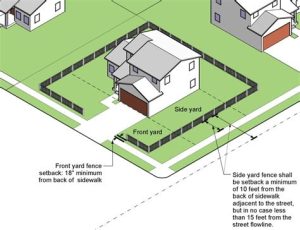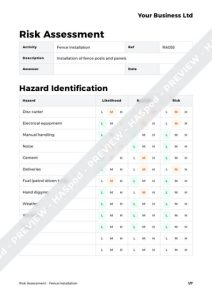Explore strategies for navigating denial issues, including local regulations, rejection reasons, professional help, and appealing decisions effectively.Navigating the world of home improvement can be a daunting task, especially when it involves securing permits for structures like fences. If you’ve recently faced the disappointment of a denied fence permit application, you’re not alone. Many homeowners encounter this hurdle, but the good news is that denial is not the end of the road. This blog post will guide you through the essential steps to effectively appeal a denied fence permit, starting with a clear understanding of the reasons behind the denial. From consulting local regulations to addressing the specific rejection reasons, we’ll explore how to strengthen your case. Additionally, we’ll discuss when it might be worth seeking professional help and, ultimately, how to move forward with your appeal. With the right approach, you can successfully navigate the appeal process and secure the fence you desire for your property.
Understanding the Denial
When your fence permit application is denied, it’s essential to understand the underlying reasons for the rejection. Denials can stem from various issues such as non-compliance with local zoning laws, failure to submit the necessary documents, or conflicts with neighborhood regulations. Each locality may have different requirements, and being aware of these can significantly impact your chances of approval.
To tackle a denied permit efficiently, it’s critical to request a detailed explanation from the local authorities. Understanding the specific grounds for denial will provide you with valuable insights that can guide your appeal process. For instance, were there specific measurements that didn’t comply, or was there a lack of necessary permits from other relevant agencies?
Moreover, keeping clear records of communications and documentation can be advantageous in your appeal. This information will not only help you address any issues but will also demonstrate your commitment to complying with local codes. A well-documented case can significantly increase the likelihood of a successful outcome in your fence permit appeal.
Consulting Local Regulations
When it comes to appealing a denied fence permit application, one of the critical steps is consulting local regulations. Each municipality has its own set of rules and guidelines pertaining to fence construction. These regulations often dictate fence height, design, materials allowed, and the permits required for installation.
Before you proceed with your appeal, it’s essential to thoroughly review the local zoning laws and building codes relevant to your area. Many local governments provide easily accessible resources online, which can include downloadable legal documents, informational pamphlets, and even online maps indicating zoning classifications.
Moreover, engaging with local agencies such as the building department or zoning board can provide clarity on specific regulations that may have contributed to the denial of your application. Understanding these regulations not only helps in crafting a robust appeal but also ensures compliance with the necessary legal standards in your next application.
Addressing Rejection Reasons
When your fence permit application is denied, understanding the reasons for rejection is crucial for a successful appeal. Identifying these factors can help you rectify the issues and strengthen your case when resubmitting your application.
Common reasons for denial usually include non-compliance with local building codes, failure to obtain necessary approvals from neighboring properties, or inadequate site plans.
| Rejection Reason | Solution |
|---|---|
| Non-compliance with zoning laws | Research local zoning regulations and adjust your plans accordingly. |
| Lack of neighbor consent | Engage with your neighbors to obtain their approval and address any concerns they may have. |
| Insufficient site plans | Provide detailed site plans that include all relevant measurements and property lines. |
By addressing these points effectively, you increase the likelihood of a favorable outcome upon reapplication. It’s essential to carefully review the rejection letter and ensure all highlighted issues are resolved before submitting again.
Seeking Professional Help
When navigating the complexities of a denied fence permit application, enlisting the help of professionals can significantly improve your chances of success. Whether you choose to consult with a land use attorney, a fence contractor with experience in local regulations, or a permit expeditor, these experts can provide valuable insights and guidance throughout the appeal process.
Land use attorneys are particularly beneficial in understanding the legal framework surrounding fence permits. They can help interpret local laws and regulations, allowing you to prepare a robust case for your appeal. Additionally, an attorney can assist in gathering the necessary documentation and evidence to support your claim.
Connecting with a local fence contractor can also be advantageous. They possess firsthand knowledge of the zoning laws and often have experience dealing with municipal offices. Their expertise can help you create a fence design that aligns with local requirements, potentially avoiding future permit denials.
Lastly, hiring a permit expeditor can streamline the process. These professionals specialize in navigating the bureaucratic maze of applications and approvals, ensuring that all paperwork is completed accurately and submitted on time. By working with someone who understands the system, you can alleviate much of the stress associated with appealing a denied permit.
Appealing the Decision
When faced with a denied fence permit application, the appeal process can seem daunting. However, understanding how to effectively appeal the decision is essential for homeowners who wish to install a fence.
- Review the denial letter: Start by carefully examining the reasons listed in the denial letter. This will provide insight into the specific issues that need to be addressed during your appeal.
- Gather supporting documents: Compile all necessary documents that support your case. This may include photographs, surveys, or plans demonstrating how your fence complies with local regulations.
- Consult with local authorities: Before filing an appeal, consider discussing your case with local officials. They can often provide additional guidance or clarify any misunderstandings related to your application.
- Prepare a detailed appeal letter: Craft a well-structured letter addressing the reasons for rejection. Be sure to highlight how your proposal meets local codes and regulations, and include any additional documentation you’ve gathered.
The appeal letter should be both persuasive and factual, presenting a strong argument on why your fence should be approved. Do not forget to cite specific codes or regulations that support your case, as this will strengthen your position.
Once your appeal is submitted, be prepared for a potential hearing where you can further advocate for your proposed fence. Demonstrating your commitment and understanding of local regulations during this hearing can make a significant difference in the outcome of your appeal.
Finally, remember that maintaining communication with local authorities throughout the process is crucial. Their feedback can be invaluable in making sure your appeal is as strong as possible, increasing the chances of a favorable decision.
Frequently Asked Questions
What are the common reasons for a fence permit application denial?
Common reasons include non-compliance with zoning laws, incorrect application forms, or failure to meet setback requirements.
What is the first step to take after receiving a denial notice for a fence permit?
The first step is to carefully review the denial notice to understand the specific reasons for the denial.
How can I gather evidence to support my appeal for a denied fence permit?
Gathering evidence may include obtaining photographs of the proposed fence location, reviewing property lines, and collecting signatures from neighbors in support.
What are the typical steps involved in submitting an appeal for a denied fence permit?
Typically, the steps include reviewing the denial details, preparing your appeal application, compiling supporting documents, and submitting the appeal to the appropriate local authority.
Is there a deadline for submitting an appeal after a fence permit application is denied?
Yes, there is often a deadline specified in the denial notice or local regulations, usually ranging from 15 to 30 days.
Can I request a hearing as part of the appeal process for my denied fence permit?
Yes, many jurisdictions allow you to request a hearing where you can present your case to a board or committee.
What should I do if my appeal for the fence permit is still denied?
If your appeal is denied, you can explore further options such as seeking legal advice, making adjustments to your application, or potentially filing a lawsuit if warranted.





